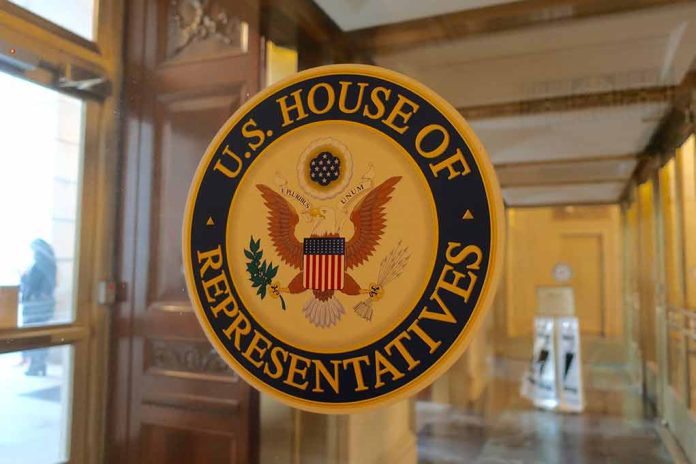
House Republicans vote to condemn Biden administration officials over the chaotic 2021 Afghanistan withdrawal, igniting partisan debate.
At a Glance
- House passed resolution 219-194, with 10 Democrats joining Republicans
- Resolution condemns Biden, Harris, and other officials for withdrawal failures
- Blames administration for 13 U.S. service members’ deaths at Kabul airport
- Move seen as political strategy ahead of 2024 elections
House Passes Resolution Condemning Biden Administration
In a move highlighting ongoing political divisions, the House of Representatives passed a resolution condemning key Biden administration officials for their handling of the 2021 Afghanistan withdrawal. The vote, which fell largely along party lines, saw a final tally of 219-194, with 10 Democrats crossing the aisle to support the measure.
The resolution explicitly targets President Joe Biden, Vice President Kamala Harris, Secretary of State Antony Blinken, and Secretary of Defense Lloyd Austin for what Republicans describe as critical failures in decision-making and execution during the withdrawal process.
The resolution, introduced by House Foreign Affairs Committee Chairman Michael McCaul (R-Texas), pointedly criticizes the administration’s approach as “chaotic” and “precipitous.” It particularly focuses on the reliance on Taliban forces for security at Kabul’s airport, a decision that has been widely scrutinized in the aftermath of the withdrawal.
House to vote to condemn Biden, Harris and others over 2021 Afghanistan withdrawal https://t.co/vcagcjYHzK
— Meet the Press (@MeetThePress) September 25, 2024
Partisan Divide and Political Implications
The vote underscores the deep partisan divide surrounding the Afghanistan withdrawal, with Republicans framing it as a catastrophic failure of the Biden administration. Democrats, however, have pushed back, characterizing the resolution as a political maneuver aimed at shifting blame away from former President Donald Trump’s role in negotiating the initial withdrawal agreement with the Taliban.
“Three years ago, the world witnessed one of the most devastating policy disasters in American history. The Biden-Harris administration withdrew all U.S. forces from Afghanistan with no plan, no care and no remorse,” said Rep. Michael McCaul.
The resolution’s passage comes at a critical time, with the 2024 presidential election looming. Republicans have intensified their messaging on the Afghanistan withdrawal, using it as a key point of attack against the Biden administration. The GOP’s focus on this issue is seen as an attempt to sway public opinion and highlight what they perceive as a major foreign policy failure under Biden’s leadership.
Controversy Over Accountability and Blame
A central point of contention in the resolution is the assignment of blame for the deaths of 13 U.S. service members killed by a suicide bomber at Kabul’s airport during the evacuation. Republicans argue that these deaths were a direct result of the administration’s mishandling of the withdrawal, while Democrats contend that the situation was complex and influenced by decisions made during the previous administration.
“Three years ago, 13 brave, innocent Americans died, and they died because Kamala Harris refused to do her job, and there hasn’t been a single investigation or a single firing,” Vance said. “Sometimes mistakes happen — that’s just the nature of government, the nature of military service. But to have those 13 Americans lose their lives and not fire a single person is disgraceful. Kamala Harris is disgraceful.”
The resolution also touches on broader national security concerns, asserting that the withdrawal caused “harm to the national security and international stature of the United States.” This claim resonates with critics who argue that the manner of the withdrawal damaged America’s credibility on the global stage and emboldened adversaries.
Looking Ahead: Political and Diplomatic Implications
While the resolution itself is largely symbolic and carries no force of law, its passage signals ongoing Republican efforts to keep the Afghanistan withdrawal at the forefront of political discourse. The vote may have implications for upcoming congressional races, particularly for the 10 Democrats who supported the measure, many of whom are facing tight re-election contests.
As the debate over the Afghanistan withdrawal continues to simmer, it remains a contentious issue that is likely to play a significant role in shaping political narratives leading up to the 2024 elections. The resolution’s passage serves as a reminder of the deep divisions in Washington and the enduring impact of foreign policy decisions on domestic politics.













